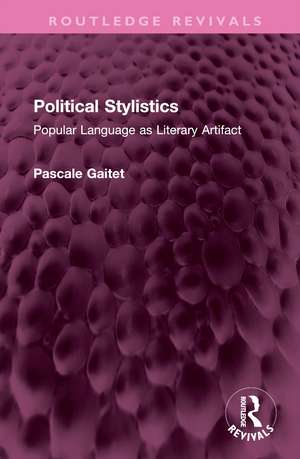Political Stylistics: Popular Language as Literary Artifact: Routledge Revivals
Autor Pascale Gaiteten Limba Engleză Hardback – apr 2024
Din seria Routledge Revivals
- 9%
 Preț: 801.71 lei
Preț: 801.71 lei - 8%
 Preț: 432.64 lei
Preț: 432.64 lei -
 Preț: 168.89 lei
Preț: 168.89 lei -
 Preț: 245.88 lei
Preț: 245.88 lei -
 Preț: 309.79 lei
Preț: 309.79 lei -
 Preț: 258.73 lei
Preț: 258.73 lei - 9%
 Preț: 764.35 lei
Preț: 764.35 lei - 9%
 Preț: 903.42 lei
Preț: 903.42 lei -
 Preț: 311.18 lei
Preț: 311.18 lei -
 Preț: 357.45 lei
Preț: 357.45 lei - 9%
 Preț: 626.93 lei
Preț: 626.93 lei -
 Preț: 317.54 lei
Preț: 317.54 lei - 9%
 Preț: 764.30 lei
Preț: 764.30 lei -
 Preț: 257.01 lei
Preț: 257.01 lei -
 Preț: 238.40 lei
Preț: 238.40 lei -
 Preț: 259.48 lei
Preț: 259.48 lei - 9%
 Preț: 938.10 lei
Preț: 938.10 lei -
 Preț: 341.33 lei
Preț: 341.33 lei -
 Preț: 264.10 lei
Preț: 264.10 lei -
 Preț: 294.98 lei
Preț: 294.98 lei -
 Preț: 308.89 lei
Preț: 308.89 lei -
 Preț: 207.40 lei
Preț: 207.40 lei -
 Preț: 347.50 lei
Preț: 347.50 lei -
 Preț: 302.59 lei
Preț: 302.59 lei -
 Preț: 389.40 lei
Preț: 389.40 lei -
 Preț: 257.01 lei
Preț: 257.01 lei -
 Preț: 358.30 lei
Preț: 358.30 lei - 9%
 Preț: 640.91 lei
Preț: 640.91 lei - 9%
 Preț: 619.49 lei
Preț: 619.49 lei -
 Preț: 228.88 lei
Preț: 228.88 lei -
 Preț: 265.16 lei
Preț: 265.16 lei -
 Preț: 257.90 lei
Preț: 257.90 lei -
 Preț: 266.06 lei
Preț: 266.06 lei -
 Preț: 258.73 lei
Preț: 258.73 lei -
 Preț: 384.01 lei
Preț: 384.01 lei -
 Preț: 246.38 lei
Preț: 246.38 lei - 9%
 Preț: 832.08 lei
Preț: 832.08 lei -
 Preț: 266.20 lei
Preț: 266.20 lei -
 Preț: 294.53 lei
Preț: 294.53 lei - 18%
 Preț: 695.86 lei
Preț: 695.86 lei - 9%
 Preț: 934.96 lei
Preț: 934.96 lei - 5%
 Preț: 243.38 lei
Preț: 243.38 lei -
 Preț: 274.69 lei
Preț: 274.69 lei -
 Preț: 208.20 lei
Preț: 208.20 lei - 9%
 Preț: 659.19 lei
Preț: 659.19 lei -
 Preț: 259.69 lei
Preț: 259.69 lei - 9%
 Preț: 1038.47 lei
Preț: 1038.47 lei -
 Preț: 389.46 lei
Preț: 389.46 lei -
 Preț: 302.14 lei
Preț: 302.14 lei -
 Preț: 302.27 lei
Preț: 302.27 lei
Preț: 527.55 lei
Preț vechi: 704.94 lei
-25% Nou
Puncte Express: 791
Preț estimativ în valută:
100.95€ • 110.09$ • 85.12£
100.95€ • 110.09$ • 85.12£
Carte tipărită la comandă
Livrare economică 24 aprilie-08 mai
Preluare comenzi: 021 569.72.76
Specificații
ISBN-13: 9781032748863
ISBN-10: 1032748869
Pagini: 242
Dimensiuni: 156 x 234 mm
Greutate: 0.61 kg
Ediția:1
Editura: Taylor & Francis
Colecția Routledge
Seria Routledge Revivals
Locul publicării:Oxford, United Kingdom
ISBN-10: 1032748869
Pagini: 242
Dimensiuni: 156 x 234 mm
Greutate: 0.61 kg
Ediția:1
Editura: Taylor & Francis
Colecția Routledge
Seria Routledge Revivals
Locul publicării:Oxford, United Kingdom
Public țintă
PostgraduateCuprins
Acknowledgements Introduction 1. A political stylistics 2. Zola’s L’Assommoir 3. Celine’s Voyage au bout de la nuit 4. Queneau’s Zazie dans le metro 5. Popular language as literary artifact Notes Index
Descriere
First published in 1992, Political Stylistics is a way of studying the formal properties of texts based on the principle that all linguistic production operates within the intricate network of power relations that structure the social realm.
